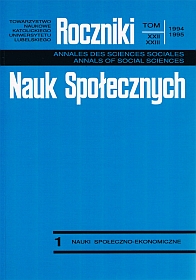The Erection of new Parishes and the Inhibition of the Process of Spontaneous Secularization
Abstract
The author takes up the problem whether the formation of new parishes inhibits the process of spontaneous secularization. He bases his analyses on an extensive empirical research carried out in the Przemys´l dioceses, both in newly erected parishes and mother parishes. The subjectmatter of his analyses is the quantitative dimension of the behavioral side of religiousness: religious practices, morality and tie with the parish.
As a result of his analyses it turned out that in the newly erected parishes, in the period of their formation, the state of religiousness was raised to a higher level. The greatest dynamics of development was noted at the level of the tie with a parish, it was smaller in the sphere of religious practices and the least in the sphere of morality. It has also been noted that in towns this increase reached a considerably higher level than in villages. In particular types of rural milieus it was inversely proportional to the degree of their openness. It has also been stated that increase in the state of religiousness concerned only part of parishioners. The other part preserved stability in this respect, and the third part (less numerous) decreased the level of their religiousness. The increase in the state of religiousness then in the newly erected parishes turned out to be varied and limited.
In the mother parishes in the same period the state of religiousness, globally speaking, did not undergo any considerable changes. This fact allows to conclude that increase in religiousness in the new parishes results from the process of formation of these parishes. The establishment of new parishes was inhibited, to a limited extent, by spontaneous secularization.
Copyright (c) 1995 Roczniki Nauk Społecznych

This work is licensed under a Creative Commons Attribution-NonCommercial-NoDerivatives 4.0 International License.


